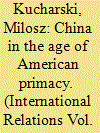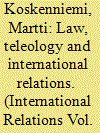| Srl | Item |
| 1 |
ID:
112423


|
|
|
|
|
| Publication |
2012.
|
| Summary/Abstract |
Recent literature on soft balancing predicts an increased occurrence of soft balancing against Washington at times when the United States acts unilaterally in foreign policy. At the same time, realist literature in IR suggests that interest violations should trigger opposition by states whose interests are being violated, unless there are unacceptable costs associated with soft balancing. In contrast to these views, this article demonstrates that interest violation and unilateralism, both individually and together, are weak predictors of soft balancing. Instead, based on the cases analyzed, I argue that soft balancing is most likely to occur when interest violations go hand in hand with perceptions of predatory intentions.
|
|
|
|
|
|
|
|
|
|
|
|
|
|
|
|
| 2 |
ID:
112421


|
|
|
|
|
| Publication |
2012.
|
| Summary/Abstract |
Interdisciplinary approaches often bemoan international law's lack of theoretical sophistication and naïve utopianism. Instead of offering effective tools of governance, it seems committed to outdated ideas about an international public realm and a dubious teleology of progress. This essay - given as the E. H. Carr lecture at the University of Aberystwyth in 2011 - reviews efforts to reform international law into a science and a more efficient instrument of international rule. Such efforts have been a part of international law's internal development but their lack of success depends on a mistaken view of the field as a 'discipline' - a set of theoretical or technical propositions. This essay defends a view of international law as an argumentative practice in which political claims are defended and attacked, rather than as a governance tool or institutional blueprint. At its worst, law may buttress bureaucratic privilege. At its best it may offer, for a cynical world, a vocabulary for imagining better futures. It may also sharpen political thought and strategic awareness, but it cannot replace them.
|
|
|
|
|
|
|
|
|
|
|
|
|
|
|
|
| 3 |
ID:
112422


|
|
|
|
|
| Publication |
2012.
|
| Summary/Abstract |
In a recent article in International Affairs Duncan Bell argued that the work of Peter Galison in the history of science could be usefully applied to the study of the history of International Relations (IR). In this article I take up Bell's challenge, claiming that Galison's post-Kuhnian history of science approach can be used both to understand the history of IR and to replace the ultimately confusing notion of 'paradigm' in the study of IR theory. Galison's method of using 'microhistories' to explore the workings of 'subcultures' in science is applied to the case study of liberal socialism in interwar IR. Through this case I argue that microhistories can help us understand why certain subcultures in IR theory thrive, and others decline. This understanding in turn could help us comprehend the state of currently active subcultures in IR, and give us an alternative to the intellectually unhelpful concept of 'paradigm'.
|
|
|
|
|
|
|
|
|
|
|
|
|
|
|
|
| 4 |
ID:
112424


|
|
|
|
|
| Publication |
2012.
|
| Summary/Abstract |
The article describes how over the past two decades the role of US forward-deployed tactical nuclear weapons has gradually declined, and explains the logic behind their decreased importance. The main arguments in favor of the continuation of the process of their removal from Europe, until they have been entirely eliminated over the next couple of years, are listed, and the reasons for NATO's desire to nevertheless prolong its reliance on these weapons are investigated. Further, the political feasibility of their complete withdrawal and the political practicalities of such a withdrawal are analyzed.
|
|
|
|
|
|
|
|
|
|
|
|
|
|
|
|
| 5 |
ID:
112425


|
|
|
|
|
| Publication |
2012.
|
| Summary/Abstract |
When Beijing hosted the Olympic Games in 2008 we were reminded that almost four decades earlier the People's Republic of China's road back to international recognition and acceptance had begun with a chance sporting encounter between two members of the US and Chinese table tennis teams in Japan in 1971. It is less well known that not long after this successful 'ping pong' diplomatic episode, attempts were made by various parties to use baseball in a similar way to try and repair international ties between Cuba and the United States. In this article the circumstances through which the former succeeded whereas the latter failed miserably are subject to detailed examination. Drawing upon existing literature and unclassified material gleaned from the National Security Archive (NSA) and the Central Intelligence Agency (CIA) Archive we argue that for a number of historically specific reasons, and because of the different balances of interest and asymmetric power relations, 'ping pong' diplomacy was able to help broker rapprochement between the United States and China, whereas 'baseball diplomacy' could do little or nothing to stimulate diplomatic relations between Washington and Havana.
|
|
|
|
|
|
|
|
|
|
|
|
|
|
|
|